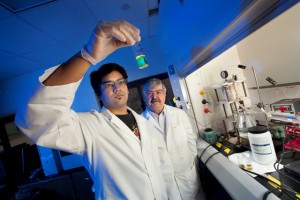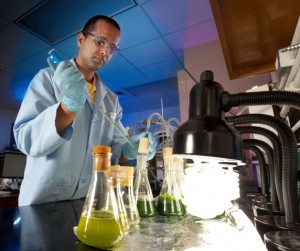
Ankit Chandra '12, left, and Javad Tavakoli, professor of chemical and biomolecular engineering
“Being a chemical engineer, I’m increasingly aware of the need to find renewable alternate sources of energy, not only because fossil fuels will eventually run out, but mainly because they have a destructive impact on the environment,” says Sherry-Ann Tim Kee ’12 (Port-Of-Spain, Trinidad and Tobago). “The onus is on the current generation to find ways to diminish the destruction our energy methods and use have caused.”
Tim Kee and five other students are researching the potential to develop fuel from biomass (algae), waste plastics, and paper with Javad Tavakoli, professor of chemical and biomolecular engineering.
“Chemical engineers have been in the forefront of the design and operation of processes that produce different types of fuels, mostly from petroleum, for more than a century,” says Tavakoli. “As new sources of energy are emerging, we are in an excellent position to keep that niche, particularly in getting fuels from biomass and waste organic materials.”
During summer 2011, Tim Kee, fellow chemical engineering majors Ankit Chandra ’12 (Gaborone, Botswana) and Aaditya Khanal ’12 (Kathmandu, Nepal), and engineering studies major Kyvory Henderson ’12 (Glen Burnie, Md.) worked with Tavakoli as EXCEL Scholars.

Aaditya Khanal '12 extracts some algae for an experiment.
“It is an exciting time to do research in energy-related issues as the demand and challenges for finding more alternative sources to fossil fuels are global issues,” says Tavakoli. “While developing our understanding of new sources of energy, my students and I hope that our research contributes to more efficient and environmentally friendly techniques of producing them.”
Tim Kee researched the conversion of cellulosic waste to ethanol and is now doing an independent study on sustainability in higher education. Chandra focused on the conversion of waste plastics to fuel. He is now doing honors work on the catalytic conversion of low-density polyethylene to fuel with the assistance of Emily Wallitsch ’13 (Kingston, Pa.), a chemical engineering major. Henderson studied the extraction of oil from algae and worked on cellulosic compounds as an independent study in fall 2011. Khanal focused on algae as a source fuel and is doing honors research studying three specific algae growth rates in different medium compositions with the help of Yue Yin ’14 (Shanghai, China), a chemical engineering major.
Chandra plans on going to graduate school for a Ph.D. in chemical engineering and to focus on alternative energy topics. He finds this research interesting because of the long-term benefits it could have.
“Results of this study could help advance the technology in better managing the global waste plastic problem,” he says.
Tim Kee hopes to attend graduate school for chemical engineering with a focus on renewable energy systems.
“There is an increasing need to find alternate, renewable sources of energy due to the diminishing resources of fossil fuels as well as the increasing environmental destruction caused by greenhouse gas emissions,” she says. “This research focuses on a sustainable method of fuel consumption and helps determine which methods produce the best cellulosic conversion and can save time for future researchers.”


3 Comments
It’s great to see that those topics are being researched in highly international and interdisciplinary teams of motivated students. We will need their enthusiasm to overcome the challenges mankind is facing!
Comments are closed.